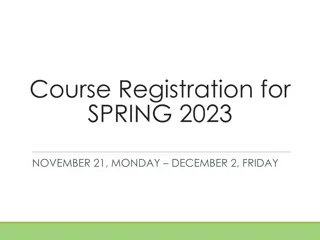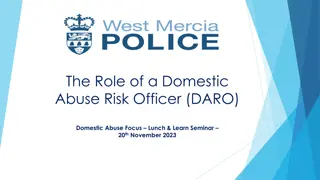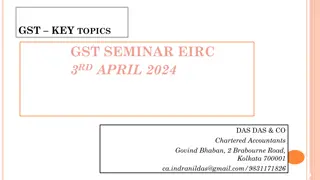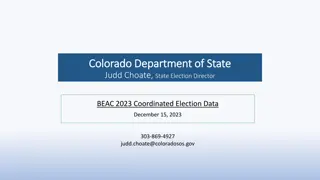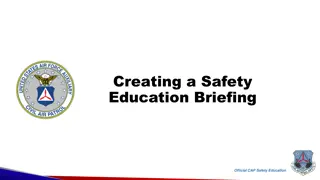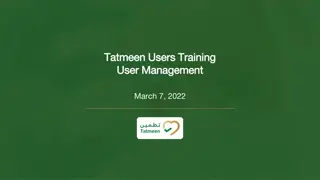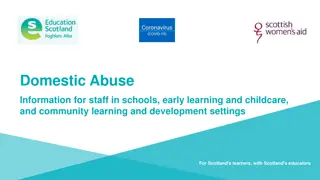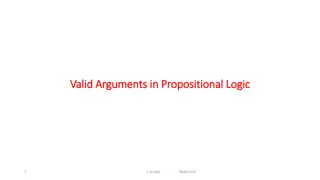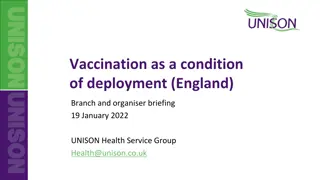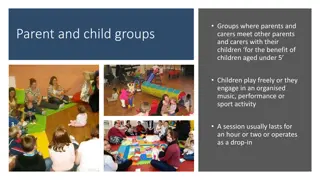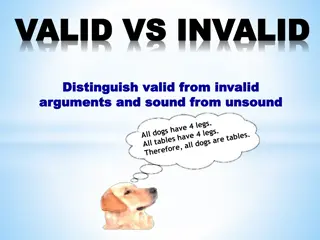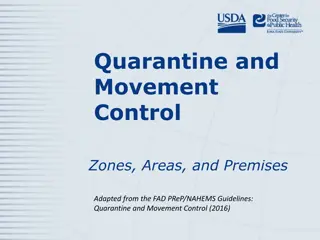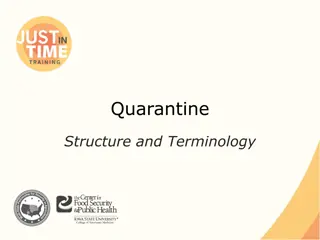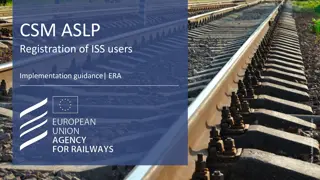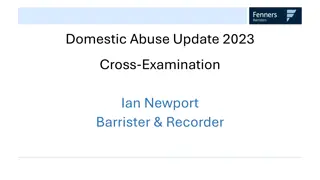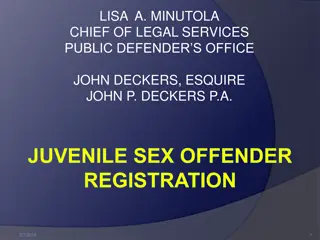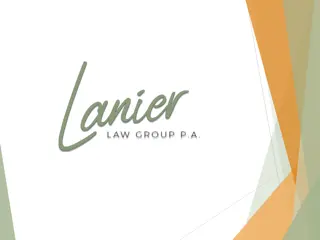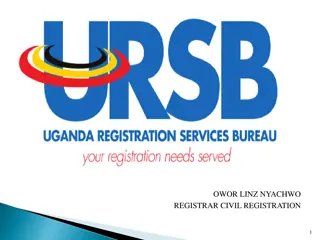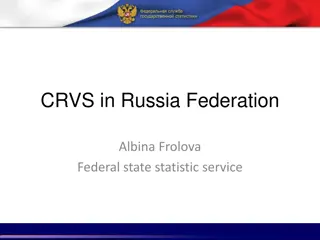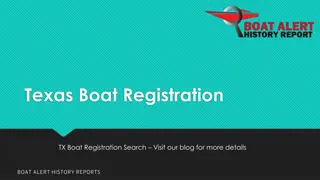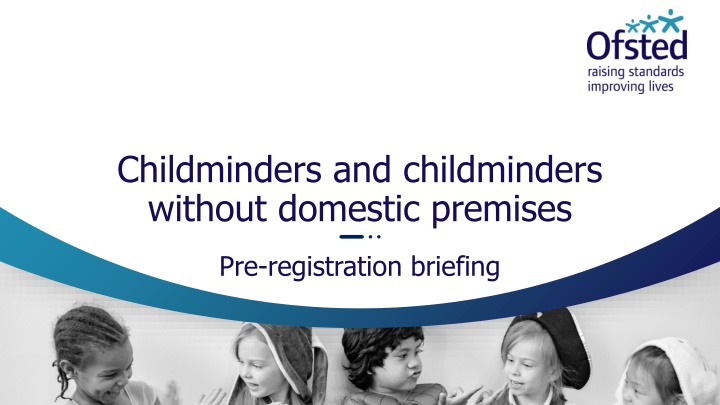
Childminders: Roles, Responsibilities, and Regulations
Learn about the roles and responsibilities of childminders with and without domestic premises, the new flexibilities introduced by the DfE, and the key roles of local authorities and Ofsted in ensuring childcare quality and compliance. Understand the differences between childminders operating from domestic and non-domestic premises, as well as the criteria for registration and enforcement by Ofsted. Stay informed about the Childcare Act of 2006 and how it impacts the provision of childcare in local communities.
Download Presentation

Please find below an Image/Link to download the presentation.
The content on the website is provided AS IS for your information and personal use only. It may not be sold, licensed, or shared on other websites without obtaining consent from the author. If you encounter any issues during the download, it is possible that the publisher has removed the file from their server.
You are allowed to download the files provided on this website for personal or commercial use, subject to the condition that they are used lawfully. All files are the property of their respective owners.
The content on the website is provided AS IS for your information and personal use only. It may not be sold, licensed, or shared on other websites without obtaining consent from the author.
E N D
Presentation Transcript
Childminders and childminders without domestic premises Pre-registration briefing
A childminder is a person who receives payment for working in a domestic dwelling. They look after at least one child for more than two hours a day. Childminders can also work some of their time from approved non- domestic premises if they choose to do so.
A childminder without domestic premises is a person who receives payment for working on non- domestic premises, such as a church hall. They are not permitted to work from any domestic dwelling at any time.
The DfE introduced new flexibilities on 1 November 2024: A new category of childminder (childminder without domestic premises) who can work entirely from non-domestic premises. Increasing, from three to four, the total number of people (childminders and/or assistants) who can work together under a childminder s registration. Childminders and childcare on domestic premises have flexibility to spend more time operating outside of domestic premises, such as at a community hall or school. Increasing the number of people needed for childcare on domestic premises to five or more people providing care (those who were registered, or applied to register, before 1 November can continue operating with four or more people).
Local authorities role The Childcare Act 2006 sets out a list of duties for local authorities: to make sure there is sufficient childcare in their area for working parents to make sure there is sufficient government-funded childcare for parents who are entitled to it to provide information, advice and assistance to parents and prospective parents to publish certain information to help with finding childcare to provide information, advice and training to childcare providers.
Ofsteds role Ofsted must register applicants, if they meet the requirements for registration and are not disqualified from caring for children. If necessary, Ofsted will take action to ensure providers comply with the requirements of registration. If childminders fail to meet or fully meet specific requirements at inspection, Ofsted will give them actions to help them improve. If there are serious concerns, Ofsted may take other enforcement action to bring about improvement, such as suspending or cancelling a provider s registration.
Childminder agencys role The Children and Families Act 2014 enabled childcare providers to register with Ofsted or a childminder agency (CMA). CMAs register and regulate childminders, childminders without domestic premises and providers offering childcare on domestic premises. CMAs help providers with training, business support, advice and finding parents. Parents can use CMAs to find childcare. Providers registered with an agency receive one quality assurance visit each year. Ofsted then inspects CMAs at intervals set by the Department for Education.
Childcare providers role Once registered, childcare providers must meet, and continue to meet, the requirements of their registration at all times. This applies even when a provider is not caring for children. Providers must notify Ofsted of any significant events, and of any changes to people living or working where childcare takes place. They must also keep their details up to date. Providers must work closely with parents and other agencies, such as the local authority.
Can I register? You must: have the right to work in the UK be suitable to work with children be physically and mentally capable of caring for children.
Requirements to register You must register with Ofsted or with a childminder agency if you are paid to look after children under eight for more than two hours a day, in a domestic dwelling and/or a non-domestic premises. You could be prosecuted if you are not registered, and you provide childcare services that must be registered.
Disqualification You are disqualified from registration if: you have been convicted of a serious offence or are barred from working with children you have been refused registration from Ofsted before you have been made subject to an order or determination removing a child from your care or preventing a child from living with you your registration has been cancelled for a reason other than not paying your annual fee
Disqualification by association If applying to be a childminder: you are disqualified by association if you live in the same premises as another person who is disqualified or you live in a household where a disqualified person is employed.
Registration exemptions Not all people who care for children are required to register with Ofsted or a childminding agency. For example, a childminder is exempt if they care for an individual child for less than two hours per day. Ofsted s exemption from registration guidance sets out: when you must register when you cannot register when you do not have to register but can choose to how to contact Ofsted about an exemption for temporary provision.
Examples of registration exemptions Looking after children aged eight or over. Looking after children for fewer than two hours a day. Caring for children as the children s parent, step-parent, foster parent or relative. Caring for the child of one or two parents in either child s own home, at any one time (a nanny).
Further examples of registration exemptions Looking after children of a friend or multiple friends for less than three hours a day for some payment. Babysitting (looking after children at home between 6pm and 2am). Provide home education to a child of school age who is educated outside school full time.
Which register to join Compulsory part of the Childcare Register Voluntary part of the Childcare Register Early Years Register Caring for children aged eight and over or If you do not need to register by law, you can choose to register your exempt childcare voluntarily Looking after children from birth to 31 August after their fifth birthday Looking after children aged five up to a child s eighth birthday
Choosing the right registration Childminders without domestic premises (CWDP) Childminders Yes. You can work most of your time from approved non-domestic premises, as long as you spend some of your time working from your domestic premises. No. You can only work from approved non- domestic premises. You cannot work from any domestic premises at any time, including for pick- up and drop-off with this registration. Can I work from domestic and approved non- domestic premises? Can I work with other people? Yes. You can work with up to three other childminders and or assistants. Will I need an enhanced DBS check with barred lists? Yes. This will also need to be a home- based check. Yes. However, this will not need to be a home- based check. Yes. Anyone aged 16 or over living or working in the home where the childcare is provided will also need to apply for an enhanced DBS check (with barred list). No. Household members of the childminder without domestic premises will not be checked by Ofsted and will not need to apply for an enhanced DBS check (with barred list). Do household members require DBS checks? Do I need to follow requirements of childminder EYFS? Yes (If applying to be on the Early Years Register).
Choosing the right registration How many people will be working with the children at any single time? There are one to four people working with children at any single time (excluding small daycare providers). There are five or more people working with children at any single time. This includes any arrangement of childminders, co-childminders and assistants. Small daycare This is a daycare/group provision registration. Where will you be working from? This is a childminder registration. Where will you be working from? Domestic premises (for some or all of the time, and possibly some of the time on non-domestic premises) Domestic premises (for some or all of the time, and possibly some of the time on non-domestic premises) Non-domestic premises at all times Non-domestic premises at all times This is a childcare on domestic premises registration This is a childminder without domestic premises registration This is a childcare on non- domestic premises registration This is a childminder registration
Registration timescales 12 weeks Early Years Register and Childcare Register applications 10 weeks Nannies on the voluntary part of the Childcare Register Approval of additional premises is usually quicker; however, it depends on whether we need to visit the provider or carry out any additional checks.
Application and registration process Before you apply Application stage Application review Registration or refusal You must decide which application form to submit based on the type of provision you want to register. Choose which registers you need. Check who needs to complete a connecting application form. We call at the start of the process to schedule the visit. This call helps to set expectations for you and us about what to expect during the registration process. We will visit the premises to determine your suitability to be registered. We do not routinely visit the premises if you are only applying for an additional setting. You need to consider what checks will be needed to support your application. You may need to consider training and will need to choose a premises.
Before you apply DBS checks Apply for your DBS check at OfstedDBSApplication.co.uk The cost for each check is set by the Disclosure and Barring Service. Childminders will need a home-based check. Separate DBS checks will be needed for anyone aged 16 or over who lives or works in your home. Childminders without domestic premises do not need a home-based check. DBS checks will not be required for anyone aged 16 or over who lives in your home.
Before you apply DBS update service Ofsted strongly recommends joining the DBS update service. The DBS sets the fees for this. You must register for the update service within 30 days of the certificate being issued. If you are not on the DBS update service, we cannot accept Ofsted DBS checks older than three months, or checks obtained through a different organisation. We may be able to accept existing certificates if you are signed up to the update service and: the DBS is an enhanced certificate for a childcare role the certificate is for a home-based role (if applying to be a childminder).
Before you apply other certificates Early Years Register: Complete a paediatric first aid course. Attend child protection training.
Before you apply other certificates Compulsory part of the Childcare Register only: Make sure that at least one person looking after children has an appropriate first aid qualification. Attend child protection training. Complete a relevant childminding course. Voluntary part of the Childcare Register only: Make sure that at least one person looking after children has an appropriate first aid qualification. Have a minimum level 2 qualification in an area of work relevant to the childcare provided, OR training in the common core skills.
Before you apply other requirements for the EYR only Complete a health declaration form, signed by you and your GP. GPs set their own fee for signing the health declaration form and you should factor in costs for this. Details of two references. One of these must be from your most recent childcare employer if you have worked with children within the last five years (either employed or voluntary). Your full employment history.
Application stage completing your form Read the guidance in full of how to become a childminder before applying. You will need to provide an email address and mobile number. An email will be sent to you with a link to access the registration service. You will be able to leave the form part way through if you need to. When you return to complete the form, a five-digit verification code will be sent to the mobile number you provided. You will need to enter this code to access your application. You will pay your application fee when you submit your completed form. It costs: 35 to join both the Early Years Register and Childcare Register, or 103 to join the Childcare Register only. Registration fees are then paid annually on your registration date.
Application review calling applicants Ofsted calls all applicants to make sure we have all the information we need. Sometimes we need to return your application form, because information is either missing or incorrect. We will explain what you need to do before resubmitting your form. Please remember to submit the application back to us. We cannot start reviewing it without all the correct information. The registration timescales begin once we have accepted your application.
Application review stage accepting and reviewing Ofsted will acknowledge receipt of your application by email after we receive your complete application form. If you have applied to the Early Years Register, we will arrange a registration visit at the start of the process. This visit will usually be eight weeks after we have accepted your application. We will update you every two weeks on the progress of your application and let you know if we need any further information from you.
The registration visit checking your suitability The inspector will check: your identity your understanding of the ages and numbers of children you can care for documents about your car (if applicable), qualifications and first aid suitability of your premises and equipment your understanding of risk assessment, safety and security your understanding of the EYFS and Childcare Register requirements that you speak English well enough to teach children and keep records in English.
The registration visit checking your suitability A decision will be made either at the visit or after the visit has ended. The inspector will tell you whether they will recommend that you are suitable or not suitable for registration. You can withdraw your application at this stage. You will then be able to apply again in the future but will need to pay a new application fee. Application fees cannot be refunded. Inspectors will take all reasonable steps to prevent undue anxiety and to minimise stress during the registration visit. You can always contact Ofsted if you have concerns that cannot be resolved with the inspector. Children s safety and well-being will always be our priority.
Inspection on the Early Years Register Once registered, we will carry out the first inspection of newly registered providers within 30 months of registration. Ofsted is required to inspect all providers at intervals set by the Secretary of State for Education, which is every six years from the date of the previous inspection. You can find all our information about inspection in our collection of guidance documents. Read our Need to know guides for helpful Q&As.
Inspection on the Childcare Register Childcare Register inspections are a compliance check to make sure providers are meeting the ongoing requirements for registration. Ofsted inspects 10% of all providers on the register each year, on a proportionate and risk basis, rather than following a prescribed inspection cycle. Our guidance on carrying out Childcare Register inspections sets out the full inspection process.
Further guidance: Early years and childcare registration SCAN ME Early years and childcare regulation Ofsted inspections of early years and childcare providers linktr.ee/ofstedbeststartinlife
Watch Ofsteds videos explaining each new flexibility available from 1 November 2024:


